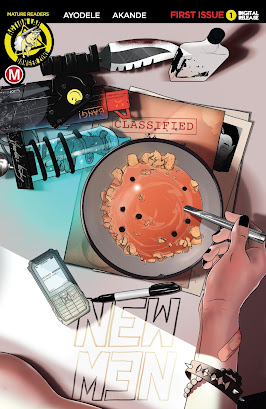With so much time having elapsed since Dragon Age: Inquisition's release, and with lore-obsessed fans going into a frenzy every time BioWare drops even the slightest morsels hinting at developments in the next game (which at time of writing, they're developing), this anthology of tie-in fiction has come at the right time.
Now the thing with official tie-in fiction, and especially with a short story anthology, is that it's unavoidably always a bit hit and miss in terms of the quality of the content – and
Tevinter Nights is no exception. While certain writers are master minds when it comes to structuring the storytelling aspects of a game, they're often not quite as deft in terms of writing fiction. And vice versa, of course.
Tevinter Nights offers an uneven reading experience, but that being said, there were some standout tales collected here. If you're a huge fan of Thedas, and are anxious to return to this world, then you will have plenty of treats here.
Patrick Weekes is known for much of the writing that they've done in Dragon Age: Inquisition, and they have also been carving out a respectable solo career as an author. Their "Three Trees to Midnight" kicks off the anthology in Tevinter, after the Qunari incursion that has resulted in the fall of Ventus. We follow the mage Myrion's point of view, who's been press-ganged into a work crew chopping tree. And he's in a bit of a pickle since the Qunari don't like mages much. To make matters worse, he's shackled to an elf – and the human/elf relations in Tevinter are not all that great. What I loved about this story is that we see a lot of banter between the two that reveals much about Tevinter society. Hijinks ensue when these two unlikely partners escape and must work as a team lest they be recaptured.
"Down Among the Dead Men" by Sylvia Feketekuty takes us to Nevarra with its culture of powerful necromancers, the Mortalitasi. Audric is but a simple guardsman with an unusual appreciation of architecture, and the last he expects is to be bitten by a possessed corpse and dragged head first into an adventure with the mage Myrna. And much to his horror, their quest sees them enter the labyrinthine Great Necropolis. I'm a bit of a sucker for a dungeon crawler, and while there is a bit of a reveal near the end that I didn't quite expect and made a lot of sense, I was quite fond of the dynamics between Audric and Myrna. Overall, this is a pleasing tale.
With a dash of a Lovecraftian flavour, John Epler's "The Horror of Hormak" brings us to two Grey Wardens on a search and rescue mission that sees them, surprise-surprise, enter the Deep Roads and encounter ... well ... Things. There were times when I felt the writing was a bit fast, but as far as typical Dragon Age quests go, this one was familiar turf. And ugh, I hate the Deep Roads.
For those anxious about the official world state post-Trespasser, "Callback" by Lukas Kristjanson offers a somewhat painful return to Skyhold when Sutherland and his friend are entrusted with the task of finding out what manner of evil now lurks in the abandoned fortress. Mired in nostalgia, this story will be fodder for the Solavellans among us to spark much debate. The story also suggests heavily that the official world states sees a disbanding of the Inquisition, with its key players no doubt going underground to face off against the threats offered by the Dread Wolf and the Qunari. I'd say "Callback" was stronger on lore than on style, but I still enjoyed the opportunity to revisit familiar turf.
"Luck in the Gardens" by Sylvia Feketekuty offers us a delightful, first-person point of view from a sassy Crow on an assignment in Minrathous. I loved the inner dialogue, and oh, the OPINIONS. Our Crow is also on the trail of an unusual beast that isn't going to be at all a cakewalk to take out. Oh, and fans of a certain Dorian Pavus need to perk their ears here. That little taste of my dearest friend was wonderful.
"Hunger" by Brianne Battye didn't number among my favourites. Two wardens are on a quest to save a village from marauding monsters. I felt the writing was a bit fast and uneven in places, so I didn't quite get into the story nor did I relate to the characters.
In "Murder by Death Mages" by Caitlyn Sullivan Kelly we return to Nevarra City with Inquisition agent Sidony on a mission for one Cassandra Pengeghast to end a Mortalitasi plot. Of course it's never quite as simple as that. Sidony has a particular disliking for the Machiavellian shenanigans rife in her home, and predictably finds herself caught up right in the midst of it all. I'll admit, not one of my favourite stories. I'd have liked a better immersion in Sidony.
Brianne Battye takes us back to Tevinter in "The Streets of Minrathous", where our protagonist, Neve, is untangling a lingering Venatori plot. We get a glimpse into Tevinter society and a bit of a noir-flavoured murder mystery.
We're back with the Antivan Crows in "The Wigmaker Job", by Courtney Woords, where our dapper two crows enter the den of a Venatori with a penchant for wigs that will make your flesh crawl. If you ever want a reason to dislike certain aspects of Tevinter socity, you'll get plenty of that with this tale. It's fast-paced, has an edge of horror, and I quite liked the dynamics between Lucanis and Illario as they sow havoc in a way that only Crows can. I have a feeling that this story in particular has a few seeds that may grow into something in the next game.
I can see what Lukas Kristjanson was trying to achieve with "Genitivi dies in the End" but the overall execution of this story was lacking. It felt rushed and not thoroughly planned out. It will, however, I suspect, provide Codex material for the next game.
"Herold had the Plan" by Ryan Cormier was another one of the stories that kinda just made me feel a bit 'eh'. There were some nice passages but overall, I found myself skipping pages. The writing felt shallow and rushed at times.
We stay with the Crows in "An Old Crow's Old Tricks" by Arone le Bray, which I felt was more a taster for us to get a better idea of the role Crows play. Lots of murder here, and it reads like a filler piece meant for world building.
"Eight Little Talons" by Courtney Woods is a delight whodunnit. Eight Crow Talons spend the weekend on an island. What could possibly go wrong? I suspect here quite a few morsels for Codex entries was dropped. This was by far one of my favourite stories in the anthology. Woods has a sharp eye for characterisation.
In John Epler's "Half Up Front" a former Altus and her elven partner embark on a mission that pays rather too well. Not suspicious at all, right? A spot of breaking and entering becomes a lot more complicated than expected. The story has a promising start but once again, unravels slightly at the end – characterisation and layering being the aspects that fell flat for me. Yet this is a story that also points Codex entries galore for the next game.
Patrick Weekes closes off things with "The Dread Wolf Take You", from Charter's point of view as she attends a meeting with fellow agents, which gave me many Feelings and Thoughts. I will give no spoilers. The central theme isn't difficult to guess, and this is perhaps the story that will give a tantalising glimpse into the larger world issues we'll be seeing in Dragon Age 4 – escalated conflict between Tevinter and the Qun, with factions within the Qun also causing trouble. Not to mention the fact that an ancient elven god wants to destroy the Veil and the world as we know it.
Let me add that Weekes is a master storyteller, and I'll most certainly be hunting down their writing after this.
Tevinter Nights is very much for the lore-hungry fans. While the writing quality is uneven across the anthology, it nonetheless scratched that itch I'm feeling for new Dragon Age content, especially considering that Inquisition came out in 2014, and I think it's doubtful that apart from the comic books and a few fiction offerings, we haven't seen much else since. Now excuse me while I got pore over "May the Dread Wolf Take You" again.






























